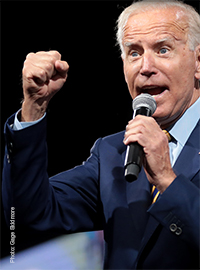| Biden Barges In |
 |
|
By Byron York
Wednesday, June 08 2022 |
There's something remarkable about the gun debate that has arisen in the aftermath of the school shooting in Uvalde, Texas. Compared to years past, the argument on Capitol Hill is somewhat muted. Yes, members of the House of Representatives are yelling at each other, but that's nothing unusual. But in the Senate, where the real work on a gun deal is going on, the talk is quiet and the anticipation low. At least, until President Joe Biden jumped into it. Before the president's speech on June 2, the mood in the Senate had been managed expectations. Democratic Sen. Chris Murphy, perhaps the Senate's leading gun control advocate, stressed that Democrats know they cannot pass a big policy initiative, like an assault weapons ban, so they are instead focused on making progress in smaller steps. "We probably can't get a universal background check bill," Murphy said May 25 on the PBS NewsHour. "We probably can't get the votes for a ban on assault weapons. But maybe we can do some smaller things." When asked what those smaller things might be, Murphy said, "We're talking about some minor expansions of background checks, getting more sales through the background check system. We're talking about red flag laws. These are the laws that allow you to take weapons away from people who are showing signs of breaks with reality or are showing signs of future violence. Those are the kinds of things that we might be able to find 60 votes on. But we will see." The message was clear: An assault weapons ban was off the table. There is no way it could pass, and it would just further divide the Senate to try. An ugly fight over a ban might mean that more modest measures get lost in the battle and never pass. So Democrats are focusing on "smaller things." That approach appears to be having some success. Murphy and a small group of Senate negotiators – Democrats Richard Blumenthal, Kyrsten Sinema, Joe Manchin and Martin Heinrich, plus Republicans Susan Collins, Pat Toomey, Lindsey Graham and Bill Cassidy – are said to have agreed on a "framework" for a gun bill. The measures they are said to be discussing include expanding background checks, some sort of "red flag" measure, enhanced school security and more money for mental health services. None of those proposals would make a huge difference in the wave of mass shootings that is afflicting the country, but they might help at the edges. And they are probably the best that can be passed in today's political environment. Most important, they are under serious consideration by a bipartisan group of senators. Until Biden barged in. In his prime-time speech Thursday, the president made a full-throated cry for an assault weapons ban. "We should reinstate the assault weapons ban and high-capacity magazines that we passed in 1994 with bipartisan support in Congress and the support of law enforcement," Biden said. "Nine categories of semi-automatic weapons were included in that ban, like AK-47s and AR-15s. And in the 10 years it was law, mass shootings went down. But after Republicans let the law expire in 2004 and those weapons were allowed to be sold again, mass shootings tripled. Those are the facts." Of course, there is some argument about that. There is debate about whether the ban reduced deaths at all. As far as the vote in 2004 was concerned, six Senate Democrats voted against extending the ban, while 10 Republicans voted in favor of extending it – a bipartisan decision. But mass shootings did increase in the years after 2004, although it is unclear what role the absence of the ban played in that. In any event, Biden's decision to elbow his way into the Senate negotiations could well have the effect of messing the whole thing up. After the speech, Graham tweeted, "I stand ready to vote on ALL the proposals mentioned by President Biden tonight and encourage the Democratic Leader to bring them forward for votes." Then Graham tweeted, "I also stand ready to work across the aisle to find common ground – something that was absent from President Biden's address to the nation." By that, Graham appeared to mean: I will happily vote against an assault weapons ban, which I believe Democrats, acting at the president's behest, should bring up for a vote because it will damage them politically. But I will also continue the work I've done with Murphy to pass other measures. In other words, Thank you, Joe Biden. The president served 36 years in the Senate. He often talks about how well he knows the institution. Why did he decide to crash the negotiations that seemed to be going well? Because, at least according to some reports, the White House is "bearish" on any gun control deal actually passing Congress. If the White House believes no bill can succeed, then might as well use the issue to score points with the Democratic base. And so Biden, who was not expected to include a assault weapons ban proposal in his speech, instead made it the highlight. The question now is whether he has messed things up again. Byron York is chief political correspondent for The Washington Examiner. COPYRIGHT 2022 BYRON YORK |
Related Articles : |
























